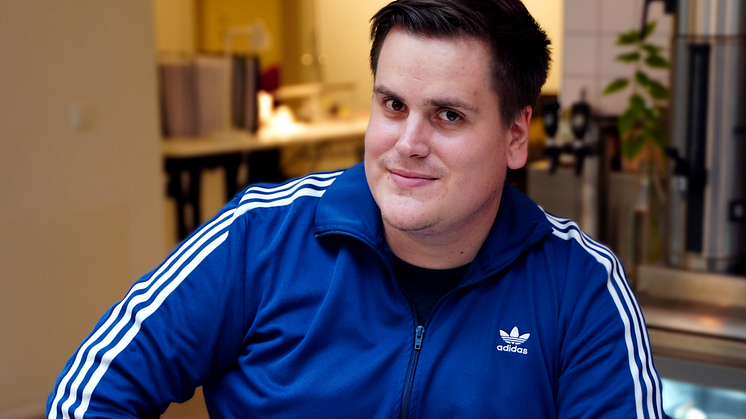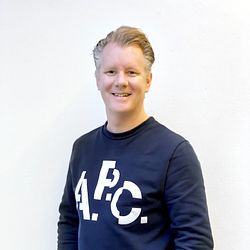
Blogginlägg -
Alster Agile with Kristoffer Karlsson
Kristoffer Karlson (or as everyone around here likes to call him: “Krille,”) is one of our most experienced and friendliest mobile app developers (and scrum masters) here at Alster. He has remained a constant force of positivity throughout the years, and has always had a warm smile to greet everyone around the office daily. Given his sunny disposition, and that his hard work here has helped shape the very process we work with today, he felt like the right man on the job to ask a few questions. We’ve grabbed a tiny bit of his very valuable time, and quickly interviewed him about how our customers work in our Agile process, what he thinks is Alster’s secret recipe for success, and about some of his personal learnings throughout the years.
Name: Kristoffer Karlsson
Job titles: Mobile app developer and scrum master
Education: Linnaeus University
Time at Alster: 6 years
Getting right to it, what are your personal feelings on Agile, and how it helps our customers here at Alster?
“The core value in Agile, that I was attracted to when I was exploring it (and that I still think is the pillar of it,) is autonomous teams. Teams that manage themselves and are empowered to make decisions that they know are best—using their own expertise and competence.”
Can you tell us why you think that’s a good thing?
“Then you have skilled individuals making decisions, instead of having the traditional top down micromanagement style—where somebody who doesn’t know about UX, backend, development, or react development (for example) makes decisions affecting things that they can’t fully control or understand.”
So, would you say It enables individuals to flourish within a project and contribute more democratically?
“I actually think it’s more about empowerment and making sure people and skills grow inside their projects. Talent should be coached to develop and grow within their team, rather than just told what to do.”
How does that contribute to a product and make the end result better?
“I believe that it creates exponential growth both in the product and the people within the project. The talent we have here are the people who ultimately create someone's product, and they end up making a lot of the decisions about the way things evolve and pivot from conception through to creation. A good example of that currently is in our client project “X”, where we have a very self-managed and autonomous team (the project name has been changed because it is currently ongoing.) The team has made a lot of decisions about how the product has moved forward, closely with the Product Owner. I feel that It has created a product that has addressed the problems and opportunities very well.”
How do you feel that Agile supports our product owners?
“I like Agile because the product owner really becomes part of the team. They aren’t just a controller. Someone who sets the orders and then follows up on them. There’s actually a feeling that we are all together in the journey, and that we’re creating something we’re all a part of.”
Do you feel that this has an effect on the quality of the product?
“Yes, definitely! I think it creates quicker feedback loops. It also creates products that can better and more quickly adapt to changes in the environment—the environment that they are supposed to support.”
Is there any way that we apply Agile here at Alster that makes us unique?
“We are pretty pragmatic in the way that we apply Agile here at Alster. We are able to scale it in a way that I think other consultancies haven’t figured out yet. I think Agile in consultancies is generally pretty difficult. It’s hard to scale and perform the process well in smaller cases especially. Also, in the case of concept development, where we do a lot of prototyping and such, I think we are doing well despite the traditional difficulties in integrating that within Scrum.”
How well do you think we handle challenges with Agile compared to any other consultancy?
“At other places I've picked up that sometimes Agile might be abused as a way to avoid commitment. It can be used as a way of avoiding dealing with fixed deadlines, hard scopes, or fixed budgets. However, here we work with our customers very transparently to realize the reality that either their budget, scope, or time needs to be a variable to avoid that stigma. No one can get a fixed product with a fixed scope, it’s not something anyone can do. That’s the thing with Agile, it’s to accept the things that you can’t change. We aim to help our customers understand the core of Agile and how It’s something that we actually do to create value for them.
We translate that It’s an impossible task to consider a product with all variables set, because there will always be elasticity in one of them in every project. That’s what you call the old project manager triangle. One of the points always needs to be transformed or flexible. Either we need to have a fixed budget and time, and make sure the scope is prioritized in the right way—so that there’s always a valuable feature coming out regardless of the conditions. Or, if we have a fixed feature list that we need to stick to, then the budget or time needs to become somewhat flexible. In general, there’s a lot of those factors to weigh in when working with Agile in a consultancy, but we really try to educate and include our Product Owners in the process as much as possible.”
How does our version of Agile work with other companies, who also have an Agile process of their own?
“There was recently a big company that came to us that had large co-dependant Agile teams, unlike our smaller ones. We developed a great positive feedback loop between them and us. They ended up learning a lot of things from us and we learned a lot of things from them. It’s always important to put ourselves and our process in a bigger context. Our version of Agile is very adaptable to many different environments. We’ve also had some very fast feedback loops in some fast moving projects. The rigidity of some implementations of Agile (particularly Scrum) could really harm that. We’re very good at Alster in changing directions quickly according to new insights.”
In layman's terms, for everyone unfamiliar, can you further explain what you mean by feedback loops?
“We essentially aim to have flexibility to adapt projects, but under some form of rigidity. The point of Agile is not to just change everything all the time, or to be able to pivot completely on the spot. It’s a structured way to allow changes based on new insights. For instance, when I worked with a recent hardware project that was integrating with software, we quickly learned that there actually wasn’t any hardware provided. We had specifications of some things we were supposed to integrate with and circumstances made sure that they didn't exist. So, what we did was pivot and create our own prototype with our own hardware. We deal with a change like that in a structured way, together with the customer, within the scrum framework, and turn it into a new iteration within the project timeline.”
What personally do you think are the best parts of the Agile environment and values?
“Trust and empowerment. I really like to see people empowered. I like to see that my team and I can work as we see fit, without a middle manager telling everyone exactly how to do things. It’s important to have empowerment to add what each professional feels is the most value to the project. Building trust within the team and the Product Owner is also important because you need the ability to act autonomously, and not sit around wasting money and time waiting for orders.”
Do you feel that more of your heart and soul is in the projects you have been empowered to work on?
“Yes, exactly! You become a part of the projects on the same basis as your Product Owner. The only difference is that the Product Owner has their own passion about creating the best prioritization of the project. I just happen to be more passionate about the backend.”
So, in summary, what do you think new customers come to us and find as a benefit from working this way?
“Here at Alster we really transparently become a part of your organization and create something together with you. If you have an Idea or opportunity, we can help you validate it and make it a reality. You don’t need to come to us with any specifications, you don’t need a PDF to tell us how to build your product, we really do full business transformation in a very transparent and co-creative way.”
Anything else worth mentioning?
“Basically I would just want to reiterate the fact that here at Alster we want to create a real relationship with people and organizations that have interesting ideas, and help them bring them to life. We want to be seen as partners and not just some hands off digital software delivery service. We’re not only consultants, we’re looking for real relationships of real value.”


